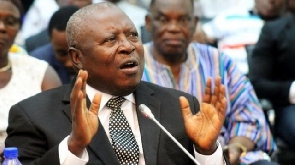Thousands of fans have gathered in Ivory Coast’s capital Abidjan to pay tribute to musician DJ Arafat.
The 33-year-old Ivorian, whose real name was Ange Didier Huon, died in a motorcycle accident earlier this month.
Hundreds of Ivorian artists took part in a stadium concert, with President Alassane Ouattara among its attendees.
Huon’s coffin was later brought to the stadium and then carried away to a local cemetery for burial.
The concert was organised after a successful online petition which called on the government to allow the use of Félix Houphouët Boigny stadium, which seats 35,000 people.
The government also pledged $250,000 towards the event and said it would pay for Huon’s funeral ceremony.
DJ Arafat was one of the most popular African musicians in the Francophone world, and had been referred to as the “king” of coupé-décalé (cut and run), an Ivorian form of dance music.
The musical genre was born in the early 2000s during Ivory Coast’s civil war and emphasised that young people still wanted to have fun despite the conflict.
DJ Arafat came to symbolise the flashy, well-dressed lifestyle associated with the music, which features fast percussion, deep bass and hip-hop-style vocals.
The singer was also known for his love of motorcycles and featured them in his most recent hit, Moto Moto, released in May, which has had more than five million YouTube views.
He released 11 albums over his 15-year career, and was named best artist of the year at the Coupé-Decalé Awards in 2016 and 2017.
He has also been posthumously nominated for two All Africa Music Awards.
Off stage, DJ Arafat was known for controversy, having faced accusations of domestic abuse.
The music star also regularly lashed out at other artists on social media.
“The clashes started because I wanted to show I was number one on the Ivorian music scene,” Huon told Jeune Afrique magazine last year.
“Above all it helped me to invent new sounds, I needed competition to find inspiration. When the music scene is sleeping, you have to wake it up”.
Entertainment of Saturday, 31 August 2019
Source: 3new.com

















